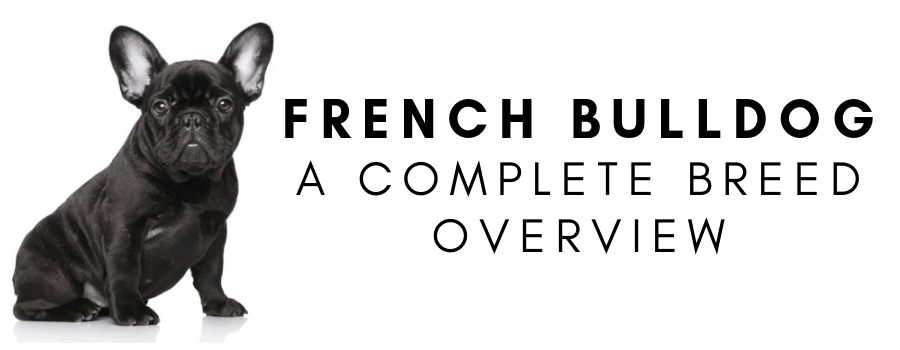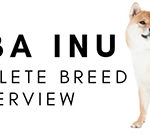Brief History
Originating in England, the French Bulldog was originally designed to be a toy-size version of the Bulldog. The breed was especially popular with lace workers employed in Nottingham.
When they became aware of better job opportunities in France, they emigrated there, and their Bulldogs accompanied them. The Bulldog’s popularity increased even more in France and Europe.
It was not unusual to see wealthy women walk into Paris cafés with their French Bulldog at their sides.
After seeing the French Bulldog at a Westminster Kennel Club show in 1896, the dog became very popular in America as well.
They quickly shortened the name to Frenchie, and this nickname is still commonly used today.
Temperament – Personality
The French Bulldog is a smart dog with a loving personality and a calm temperament. They love nothing more than to sit on their owner’s lap or next to them on the couch.
Their personality has earned them one of the top ten spots of the American Kennel Club’s most popular dog list.
In fact, the French Bulldog is the 4th most popular dog in America. They’re a small dog that doesn’t require much space.
French Bulldogs don’t bark excessively (learn more about Frenchie barking here) and are known for being great apartment dogs.
Their personalities often differ from one Frenchie to the next. One might be very calm while the other might be filled with energy and always raring to play.
They’re very social dogs that adapt well to almost any environment.
They do have a tendency to be stubborn when it suits the occasion. This is something that is best nipped in the bud when they’re still puppies.
This is just one of the many issues covered in our Frenchie book, The Owner’s Guide To The Perfect French Bulldog.
This book walks you through every aspect of raising and caring for your new Frenchie.
You’ll learn all about puppy proofing, housebreaking, avoiding common mistakes, training, grooming, exercising, mental stimulation, and so much more.
If you are going to invest your time and money in a French Bulldog, isn’t it worth doing everything the right way from the very beginning?
That’s exactly what you’ll be able to do with the guidance and advice found in this book. Grab your copy today!
Is French Bulldog A Good Family Dog?
There are not enough good things to say about the French Bulldog in regards to its suitability as a family dog. They have a friendly, loving personality with people of all ages.
You’ll seldom hear a French Bulldog owner tell guests that their dog is not good with children or certain age groups.
They love being around people and spending as much time as possible with them.
Unlike many dogs that do best with a large yard or in a large home, the French Bulldog makes the perfect family dog regardless of where the family might live.
The French Bulldog’s high intelligence makes them very trainable.
Although male French Bulldogs may fight with other male dogs, this is can be remedied with early socialization and training.
(Be sure to read our Complete Guide to Socialization to learn what exactly is involved and the important benefits it provides your dog.)
Typically, French Bulldogs get along well with other dogs and with cats. In fact, we have an entire article on this topic here.
Is the French Bulldog Good with Kids?
French Bulldogs are exceptionally good with kids.
Unlike many large dogs whose size intimidates children, the French Bulldog is small enough in size to make children less fearful and more comfortable.
Their gentle temperament, high intelligence, and playful personality make them ideal companions for children of all ages.
Physical Traits
One of the most noticeable traits of the French Bulldog is its heavy bones and muscular body.
The second most noticeable trait, or possibly the first for some people, is the loose, floppy skin they have around their face or throat.
They are a compactly built dog of small or medium size with a smooth coat. They have large heads and short legs.
French Bulldogs are usually about 11 to 12 inches tall at the shoulders and weigh between 19 and 28 pounds.
The standard colors for French Bulldogs are brindle, brindle and white, solid white, white and fawn, white and brindle, cream, fawn brindle, fawn and white, and cream and white.
Their eye color, paw color, and mask color often differ from their overall body color.
Do French Bulldogs Shed?
French Bulldogs do not shed that much and can be considered average shedders.
They do have an undercoat, so they will do most of their shedding during the spring and fall when they’re losing their undercoat and getting in a new fresh coat.
Brushing them during these times can eliminate a lot of the shedding.
A double-sided dog brush, like this one with both a rubber side and a soft-bristle side, works best.
Care and Maintenance
The French Bulldog needs regular care and maintenance just like any other breed of dog.
For starters, maintenance involves combing and brushing the dog regularly, especially when he’s going through his seasonal shedding.
It also includes socializing and training the dog as well as providing him with the exercise he needs to be as healthy as possible.
Socializing
Socializing is important with any dog, and the French Bulldog is no exception. Socialization should begin when the dog is still a young puppy.
They should be socialized around children, cats, dogs, and any other animals they may meet throughout their lives.
Male Frenchies often don’t get along well with other male Frenchies. Socializing them around other dogs early in life can help prevent these canine fights.
Taking the Frenchie to the park or obedience classes are two great ways to socialize the dog.
Food and Nutrition
Feeding your Frenchie may seem like a simple enough task, but it’s important to not just feed him the amount he needs but also to feed him high-quality dog food.
The quantity of food you give your Frenchie will depend on his weight and his activity level.
French Bulldogs are typically lazy dogs, so you may want to adjust the feed accordingly to prevent the dog from being overweight.
As a rule of thumb, your Frenchie should be fed about 25-30 calories per pound of body weight.
If your dog weighs 20 pounds, he should get about 500-600 calories per day split into two feedings.
Monitor the dog’s weight. If he appears too thin, you may want to increase it a little. You should not be able to see the dog’s ribs.
If he’s starting to get overweight, you can cut back a little.
Keep in mind that Frenchies will continue to eat as long as the food is in front of them. It will be up to you to adjust the amount the dog gets every day.
When choosing a dog food, choose one that has meat as its main ingredient. Click here to see which dog foods we found to be most appropriate for Frenchies.
If you give your Frenchie dog treats, try to stick with healthy, nutritious snacks. If you need a quick refresher on what “people food” is okay and what’s not, head over to this article.
Avoid feeding treats too often. They will become used to them and expect them all the time.
Do French Bulldogs Need to be Groomed & Bathed?
French Bulldogs do need to be groomed but have little need for excessive grooming.
Brushing the Coat and Teeth
You could probably get by with brushing them once a month, but most owners prefer to brush them weekly to keep the coat looking healthy and shiny.
It’s a good idea to brush your Frenchie’s teeth once or twice a week to keep the gums and teeth healthy and to prevent painful dental problems later in life.
Just be sure to use a dog-safe toothpaste and a gentle brush, like in this combo pack.
Nail Care
You may or may not need to clip the dog’s nails depending on if they wear them down naturally on their own.
A dog that spends a lot of time outdoors may wear them down, whereas a dog that is mostly indoors may need them clipped periodically.
Dogs don’t often enjoy having their toenails clipped, but if you begin doing it when the dog is still a puppy, he’ll be more receptive to the idea as he grows older.
Our article on nail trimming explains how to do it step by step and how to deal with accidentally nicking the quick.
Many owner opt to use a nail grinder instead of clippers (here are the best ones), and as long as your Frenchie doesn’t mind the noise, this is a great option.
Bathing
Frenchies shouldn’t need a bath more than once a month. If the dog spends most of his time indoors, you can even do it less frequently.
Ear Cleaning
The French Bulldog has floppy ears that should be cleaned at least once a month if not more. Use an ear cleanser designed for dogs.
Just add a few drops in each ear, gently massage the base of the ear, wipe off excess, and allow the dog to shake his head.
Always make sure they’re thoroughly dried to avoid ear infections.
Wrinkle Care
The loose skin hanging around the throat needs to be cleaned, especially in and around the flaps. This area needs to be cleaned at least once a week.
Using a pet wipe or soft damp cloth, gently remove the dirt from under the flaps and wrinkles. Then dry the area thoroughly.
It’s important to make sure this area is dry after he’s had a bath or been in the water. Failure to keep this area dry can result in bacteria and infection setting in.
How Much Exercise Do They Need?
Although French Bulldogs should get regular exercise to keep them in shape, they don’t need a lot of exercise.
They do need to be monitored during the summer months because they don’t handle the heat well.
With their brachycephalic faces, they often suffer from breathing difficulties if they overdo the exercise or spend too much time in hot weather.
A walk once a day is generally all these dogs need, and the dog will love this time with his owner.
This 149-page ebook is the ultimate owner’s guide for the breed – packed with tips, tricks, and answers to the most popular and frequently asked questions. Avoid the frustration, lost time, and wasted money that comes with not knowing how to properly and easily care for your Frenchie.
Health Issues – Common Health Issues and Any Special Needs
Every dog breed is prone to developing some sort of genetic health issues. There is no guarantee that the dog will develop these health issues.
It’s just that, because of their ancestors, they’re more prone to developing certain conditions, and owners or potential owners should be aware.
You can read more about Frenchie health concerns here, but for now here are some health issues common with the French Bulldog.
- Hip Dysplasia – This inherited disease occurs when the femur doesn’t fit tightly into the hip joint’s pelvic socket. It causes the hip joints to become dislocated causing the dog pain and often lameness as they get older. Responsible breeders often have their dogs screened and tested by the Orthopedic Foundation for Animals. The OFA gives the dog a score based on the dog’s hips.
- Brachycephalic Syndrome – Typically found in dogs with short heads, soft palates and narrowed nostrils, this disease causes obstructed airways and breathing difficulties, particularly in warm weather or when the dog is stressed and overtired.
- Von Willebrand’s Disease – This is a blood disorder that causes the dog to bleed excessively due to a reduced amount of the von Willebrand factor. There is no cure for this disease.
- Hemivertebrae – This condition develops when at least one vertebrae is malformed and develops a triangular shape. Unless it’s putting pressure on the spine, there is no treatment for this condition. It can go unnoticed, or it can also lead to weakness, pain and even paralysis.
- Intervertebral Disc Disease – This disease occurs when a spinal disc herniates or ruptures and pushes into the spinal cord. This disease can occur from age, trauma or even if the dog jumps off a high place. IDD is painful for the dog and can lead to weakness and even paralysis.
- Patellar Luxation – Commonly found in small dogs, this disease occurs when the patella, which consists of the kneecap, calf and thighbone, is not lined up correctly and slips out of place. It can cause an abnormal gait, a bow-legged appearance or lameness. This disease is also known as “slipped stifles.”
- Cleft Palate – This problem occurs when there is either a unilateral or bilateral slit in the dog’s palate. Surgery is the only treatment.
- Elongated Soft Palate – This occurs when the soft palate in the dog’s mouth becomes elongated, causing obstructed airways and difficulty breathing. Surgery is the only treatment for this problem.
- Allergies – The French Bulldog, like many other breeds, can be susceptible to allergies. The allergies are usually one of three types: food-based allergies, contact allergies or inhalant allergies. Allergies can often be treated depending on the severity of the allergy. Many allergies result in ear infections for the dog.
French Bulldogs typically have a lifespan of 10 to 12 years.
What Roles Are French Bulldogs Best Suited For?
Being such a loving and intelligent dog, the French Bulldog is well suited for many things. However, its purpose as a family dog is the one it fulfills the most.
Its love of family and people, in general, make it a wonderful family dog.
Its short compact body and brachycephalic face usually prevent it from being agile enough to participate in agility competitions.
However, a few of this breed were the exception and did participate in agility competitions.
French Bulldog owners often choose to show them in AKC canine conformation competitions. Despite this, their best role is still that of a loyal and loving family member.
How Much Does A French Bulldog Cost?
Once you start your search for a good French Bulldog, you’ll probably be amazed at how much the price varies.
So many factors go into determining the cost of a French Bulldog (see the main causes of high prices here).
Typically, French Bulldogs go for between $1,500 and $3,000 with the average cost at about $2,200. However, the cost can go even higher if the dog is part of a high-quality breeding line.
With professional breeders, the breed lines can increase the price to anywhere from $5,000 to $10,000.
If you’re not interested in lineage or breeding lines and choose to get your French Bulldog from a rescue or shelter, you can expect to pay a lot less.
Here are some of the factors that can help determine the cost of a French Bulldog.
- Whether it’s coming from a rescue, shelter or breeder
- Amount of money that’s gone into the dog
- Breeder’s reputation
- Location
- Dog’s bloodline
- Age of dog
- Level of training
- Litter size
Finding Reputable Breeders
Buying a French Bulldog from a breeder can be a daunting task because you want to make sure you’re dealing with a reputable breeder.
Unless this is a local, well-known breeder, it will be hard to tell if the breeder is an honest and reputable breeder.
Your local veterinarian may be able to offer some recommendations on French Bulldog breeders in your area.
If you’re dealing with the internet, you’ll have your work cut out for you.
While it’s a little more difficult finding a reputable breeder on the web, it can be done if you exercise caution and do your research.
Most breeders have websites, which make it easier to look for online reviews on the breeder.
Here are some red flags to be aware of when considering a breeder.
- The breeder is uncomfortable answering all your questions.
- The breeder doesn’t want you coming to his establishment.
- If you do go to his establishment, it’s dirty and unkempt.
- The breeder sells more than just French Bulldogs. This could indicate it’s a puppy mill.
- The puppies look thin or dirty and do not exhibit normal puppy playfulness and curiosity.
There are also organizations that either deal exclusively with French Bulldogs or can offer information on French Bulldog breeders or just information on the breed.
Social media sites like Facebook or Twitter may also be a good resource for finding French Bulldog groups. Here are a few French Bulldog organizations.
- French Bulldog Club of American
- Chicago French Bulldog Rescue
- French Bulldog Rescue Network
- French Bulldog Village Rescue
- French Bulldog Second Chance Rescue
- American Kennel Club
Adopting a French Bulldog
Adopting a French Bulldog from a rescue group or animal shelter will generally cost you a lot more than buying from a French Bulldog breeder.
Prices generally start at about $250 and can go as high as $750.
The price can vary depending on the location, coat color, and age of the dog.
The adoption fee usually goes towards the dog’s care prior to adoption as well as the costs of food, vaccinations, and spay/neuter. Some rescue groups specialization in French Bulldogs.
Searching online is a great way to find French Bulldog organizations near your location.
If you enjoyed this article, you’re sure to love all the other information you’ll find on our Frenchie page. Click here to see our 30+ articles devoted to this adorable breed.
Last update on 2024-04-19 at 19:50 / Affiliate links / Images from Amazon Product Advertising API









